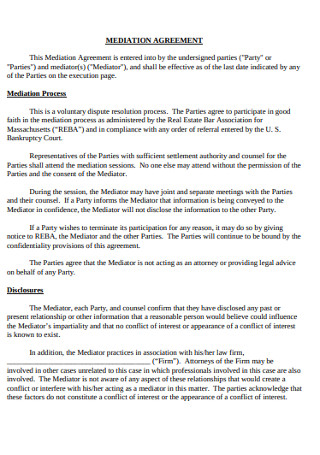
Can a Judge Overrule a Mediation Agreement?
Mediation is a widely used alternative dispute resolution process where a neutral third party, known as a mediator, helps parties in a conflict reach a mutually acceptable resolution. It is often considered a less formal and more flexible approach compared to traditional litigation. Mediation agreements are legally binding contracts that outline the terms agreed upon by the parties involved. But can a judge overrule a mediation agreement? Let’s dive into this question and explore the factors involved.
Understanding the Nature of Mediation Agreements
Before discussing the ability of a judge to overrule a mediation agreement, it is essential to understand the legal nature of these agreements. A mediation agreement is a contract voluntarily entered into by all parties involved in the mediation process. It is typically based on the principle of party autonomy, meaning the parties have the freedom to design the terms of their agreement.
In most jurisdictions, mediation agreements are enforceable just like any other contract, provided they meet certain legal requirements. These requirements usually include mutual assent, consideration, and clarity of terms. Once parties sign a mediation agreement, it becomes legally binding, and the terms established within it are expected to be honored by all parties involved.
The Finality of Mediation Agreements
One of the fundamental principles of mediation is that the agreement reached between the parties is final and binding. When parties voluntarily participate in mediation, they do so with the intention of resolving their disputes amicably and avoiding the potentially costly and time-consuming process of litigation.
As a result, courts generally uphold the finality and enforceability of mediation agreements. The rationale behind this approach is to encourage parties to engage in mediation in good faith and honor the agreements they reach.
The Limited Circumstances Wherein a Judge Can Overrule a Mediation Agreement
While mediation agreements are typically considered legally binding and final, there are limited circumstances in which a judge may have the authority to intervene and overrule the agreement. These circumstances can vary depending on jurisdiction and the specific facts of the case.
- If the Mediation Agreement Violates Public Policy: A judge may have the power to invalidate or modify a mediation agreement if it violates public policy. Public policy encompasses principles and standards deemed essential to the welfare and well-being of society. In such cases, a judge may determine that an agreement is unjust, unconscionable, or against public policy, and therefore unenforceable.
- If There Was Fraud, Duress, or Coercion: If a party can demonstrate that the mediation agreement was entered into under duress, coercion, or as a result of fraud, a judge may have the authority to intervene. These situations undermine the voluntary nature of the agreement, which is a critical element of mediation. A judge would carefully assess the evidence presented and make a determination based on the specific circumstances of the case.
- If the Mediation Agreement Contains Ambiguities: Ambiguities or vagueness in a mediation agreement can create confusion and make it difficult for parties to fulfill their obligations. In such cases, a judge may intervene to clarify the terms of the agreement, particularly if the parties cannot come to a resolution on their own. The judge’s role here would typically be to interpret the agreement rather than overrule it entirely.
Factors Influencing a Judge’s Decision
When faced with a request to overrule a mediation agreement, a judge considers several factors in making a determination. These may include:
- The specific legal provisions governing mediation agreements in the jurisdiction.
- The evidence presented regarding fraud, duress, coercion, or violation of public policy.
- The consistency of the mediation agreement with applicable laws and regulations.
- The clarity of the agreement and potential ambiguities that may require judicial interpretation.
- The overall fairness of the agreement, taking into account the parties’ intentions and the circumstances surrounding its formation.
The Importance of Complying with Mediation Agreements
While judges may have the authority to intervene under certain circumstances, it is crucial for parties involved in mediation to approach the process in good faith and to comply with the agreements they reach. Mediation is often preferred for its flexibility and ability to preserve relationships, but if parties do not honor their agreements, it can undermine the efficacy of the process.
In summary, mediation agreements are generally considered legally binding contracts that parties are expected to honor. However, in limited circumstances involving violations of public policy, fraud, duress, coercion, or ambiguous terms, a judge may have the authority to overrule or modify the terms of a mediation agreement. It is advisable to consult with legal professionals who specialize in mediation and local laws to understand the specific provisions and requirements of your jurisdiction.
Frequently Asked Questions
Can a judge overturn a mediation agreement in any situation?
No, a judge can only overturn a mediation agreement in specific circumstances, such as when the agreement violates public policy, is a result of fraud, duress, or coercion, or contains significant ambiguities.
What happens if one party does not comply with a mediation agreement?
If one party fails to comply with a mediation agreement, the aggrieved party can seek legal remedies through court proceedings. The court may enforce the terms of the agreement and potentially award damages to the non-compliant party.
Why is it important to engage in mediation in good faith?
Engaging in mediation in good faith is vital to ensure the effectiveness of the process. It encourages parties to negotiate in a fair and honest manner, and it promotes the spirit of cooperation and compromise necessary to reach mutually acceptable agreements.
Can a judge modify the terms of a mediation agreement?
Yes, in certain circumstances, a judge may modify the terms of a mediation agreement if the terms are ambiguous or if the parties cannot come to a resolution on their own. The judge’s role is to interpret the agreement rather than invalidate it entirely.
Remember, the specific laws and regulations regarding mediation agreements may vary depending on your jurisdiction. It is always best to seek legal advice from professionals familiar with the laws of your specific jurisdiction.

Source Image: sample.net

Source Image: techcrunch.com
Mediation Warwick – MIAM There are two possible scenarios. One where the case has already been filed and assigned to a judge and the other when you have a pre-litigation mediation. Settlement with case pending. If the case has been filed and assigned to a judge, the obvious enforcement mechanism is to file a motion to enforce pursuant to Code of Civil Procedure section







